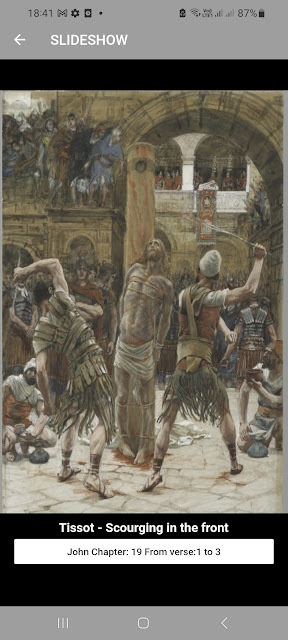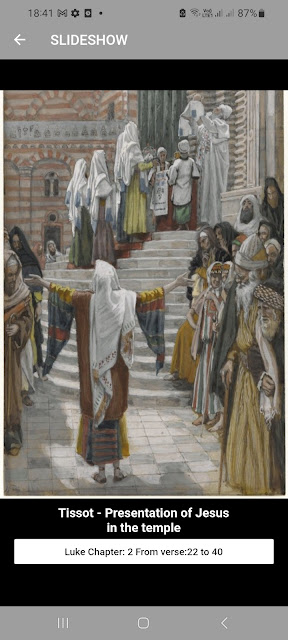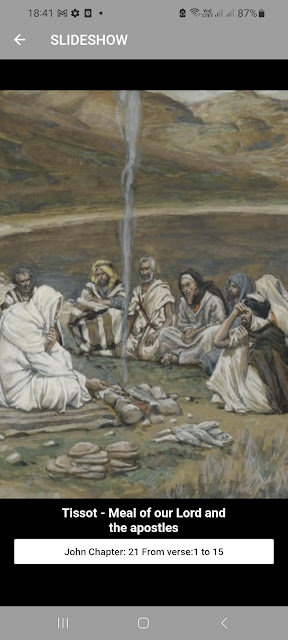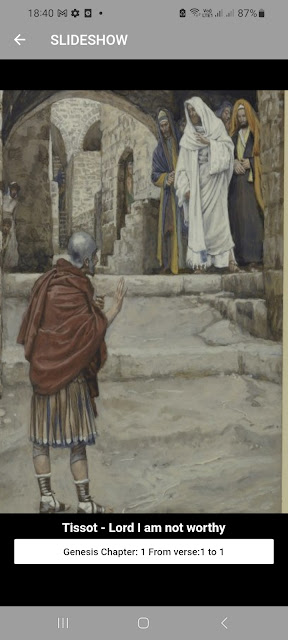Find below our Jesus wallpaper for phone app in various scenes of the gospels.
a) Tissot Sermon on the beatitudes Matt 5: 1-12
It is believed that the Sermon on the Mount was given early in Jesus' ministry, likely around AD 30-32. At this time, Jesus had already begun to attract large crowds of people who were drawn to his teachings and miracles.
The Beatitudes are the opening statements of the Sermon on the Mount and serve as an introduction to the rest of Jesus' teachings. They offer a glimpse into the character of the people who will inherit the kingdom of God and serve as a call to a higher standard of living.
In summary, the beatitudes are as follows:
a) "Blessed are the poor in spirit, for theirs is the kingdom of heaven.
This is to understand that our very existence is entirely dependent on the Lord. There is nothing that we can do in our own right to justify acceptance by Him; it is purely a gift. Indeed, we must live by the spirit that indwells us, but we must acknowledge that without Gods grace, we remain totally unworthy. We should not be proud about our excellence, nor distraught at out ineptitude; we take all to Him in the spirit.
b) "Blessed are those who mourn, for they shall be comforted."
This refers to mourning in the usual sense, at the harshness and difficulty of the lives we lead as well as the mourning that comes from attaining a higher spirituality. We live in a depraved world where there seems no justice for the poor and a never ending deifying of mammon. You will be comforted!
c) "Blessed are the meek, for they shall inherit the earth."
I have always had a problem with the way this beatitude is interpreted by many scholars. Christianity is not a weak mans religion; it requires strength of character, since it demands of one what is considered foolish in the world at large. To be caring, to be gentle, to accept slight for the sake of harmony and thus drawing people in with your difference. It however does not mean allowing anyone to ride roughshod over you. If this were the case, how can Christians carry forward the ethic of "all men created in the image and likeness of God"?
d) "Blessed are those who hunger and thirst for righteousness, for they shall be satisfied."
This beatitude follows very nicely from the previous three. First a realization that we are sinful creatures, then we mourn at our own depravity, then we stand as a light to other believers in the prayer and hope of a Kingdom on earth as it is in heaven.
e) "Blessed are the merciful, for they shall obtain mercy."
In my view mercy is a quality that is best exemplified by charity or love. In everything we do, let mercy be the starting point. St Paul in his writings in 1st Corinthians, tells the strong not to look down on the weak, and the weak not to slander the strong; but in everything we say and do, let charity be the guiding principle. Are we not all of one Christian community, with one master? Indeed, as is expected in every community, there are all sorts, but let the common denominator be mercy, charity or better worded, LOVE!
f) "Blessed are the pure in heart, for they shall see God."
The words are self explanatory, however it is not possible to achieve without effort and constantly immersing yourself in His word. It is not enough to just read the bible. As laymen, commentaries by experts, people that make the bible and its teachings their careers, is a necessity. I encourage you to immerse yourself in the bible along with good commentaries.
g) "Blessed are the peacemakers, for they shall be called sons of God."
Again self explanatory. Man is a creature of ego, and the Lord has told us to put it aside for the betterment of the community as a whole.
I have always thought about this beatitude in a different way. Imagine the earth finds itself with an existential threat in the way of "space creatures". Would we not immediately put aside our differences, ignore our prejudices of color, intelligence, wealth or poverty and the like. We would act as one; THE HUMAN RACE. Indeed we are a stupid lot.
h) "Blessed are those who are persecuted for righteousness' sake, for theirs is the kingdom of heaven."
If you agree with the previous 7 beatitudes, this one become a truism. For those that are seeking the meaning of life, then this is the one to choose. Self sacrifice for the well being of others, even your very life. Walk with a heart that is always willing to defend others for Christ sake; in much the same way that he sacrificed himself for us.
i) Tissot Scourging in the front John 19: 1-3
The Roman soldiers who were in charge of Jesus' execution, as part of their customary practice, stripped him, tied him to a pillar or post, and whipped him with a scourge made of leather thongs or cords, sometimes with pieces of metal or bone attached to the ends. The painting brings the event very forcefully to our minds. It is when we look at a painting like this one, that we ae reminded of the extent of the Lords sacrifice for us. We should not be lax in the practice of our Lords teachings.
j) Tissot Scapegoat Lev 16: 8-10
In Leviticus 16:7-10, the High Priest is instructed to take two goats, and cast lots to determine which one will be offered as a sacrifice to God and which one will become the scapegoat. The goat that was chosen as the scapegoat would then have the sins of the people symbolically placed upon it before being driven into the wilderness, representing the removal of sin from the community.
In the New Testament, the concept of the scapegoat is not explicitly mentioned, but the idea of the Lord as a sacrificial lamb who takes on the sins of humanity is similar in some ways. In John 1:29, John the Baptist refers to Christ as "the Lamb of God who takes away the sin of the world." This metaphor of sacrificial lamb is echoed throughout the New Testament, emphasizing the idea of Christ's sacrifice as a means of atonement for the sins of humanity.
k) Presentation of Jesus at the temple Luke 2: 22-40
Mary and Joseph brought the infant to the temple in Jerusalem to present him to God and to perform the customary purification rituals. Upon arriving at the temple, they encountered Simeon, a devout priest who had been promised by the Holy Spirit that he would not die until he had seen the Messiah. Simeon took the baby in his arms and blessed him, saying, "Lord, now you can let your servant depart in peace, according to your word; for my eyes have seen your salvation which you have prepared in the presence of all peoples, a light for revelation to the Gentiles, and for glory to your people Israel."
They also met Anna, a widow who had served in the temple for many years. She recognized Him as the Messiah and began praising God and speaking about Him to all who were waiting for the redemption of Israel.
l) Meal of our Lord and the apostles by the sea of Tiberias John 21: 1-15
After his resurrection, He appeared to his disciples on several occasions. One of these appearances occurred by the Sea of Tiberias (also known as the Sea of Galilee) in the region of Galilee.
The disciples had been fishing all night but had caught nothing. The Lord appeared on the shore, but they did not immediately recognize him. He called out to them, telling them to cast their nets on the other side of the boat. When they did, they caught a large number of fish.
Upon recognizing the Lord, the apostle Peter jumped out of the boat and swam to shore. The other disciples followed in the boat, dragging the net full of fish behind them. The Lord then invited them to have breakfast with him. He cooked fish and bread over a charcoal fire and served it to them; this was reminiscent of the last supper.
f) Mary Magdalene at the feet of Jesus John 12:1-8
In the biblical account the Lord was having dinner at the home of Mary and Martha when Mary Magdalene came in with an expensive jar of perfume made of pure nard. She knelt down at His feet and poured the perfume over them, then wiped his feet with her hair. This act of devotion was met with criticism firstly due to the cost of the perfume, and secondly because she was a known prostitute.
The Lord defended her, saying, it was intended that she should save this perfume for the day of his burial (foreshadowing his death). As for the cost, he said that the poor will always exist however he will not always be here physically; again foreshadowing his death.
This story is significant because it highlights His acceptance of women as disciples and his willingness to challenge the social conventions of his time (given her lowly status).
g) Lord I am not worthy Matt 8: 8-10
In this passage, a centurion comes to Christ and asks him to heal his servant who is lying paralyzed and suffering at his home. Jesus offers to come and heal the servant, but the centurion responds, "Lord, I am not worthy to have you come under my roof. But just say the word, and my servant will be healed. For I too am a man under authority, with soldiers under me. And I say to one, 'Go,' and he goes, and to another, 'Come,' and he comes, and to my servant, 'Do this,' and he does it."
The Lord is amazed by the centurion's faith and his understanding of authority. He says to those around him, "Truly, I tell you, with no one in Israel have I found such faith." He then heals the servant from a distance.
This passage is significant because it highlights the power of faith and the recognition of The Lords authority. This is further compounded by the fact that the centurion was not a Jew, yet was willing to place himself under Jesus' authority, despite the seniority given to Roman citizens more so soldiers over the Jews.
Enjoy






